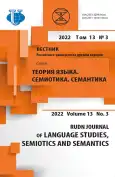Situation Awareness Paradoxicality and Paradoxical Logic of Characters in the Novels of I. Ilf and Eu. Petrov
- Authors: Ryadchikova E.N.1, Kadilina O.A.2,3, Vered V.T.3
-
Affiliations:
- Kuban State University
- Kutafin Moscow State Law University
- Peoples’ Friendship University of Russia (RUDN University)
- Issue: Vol 13, No 3 (2022)
- Pages: 827-843
- Section: LINGUISTICS OF THE TEXT
- URL: https://journal-vniispk.ru/2313-2299/article/view/323492
- DOI: https://doi.org/10.22363/2313-2299-2022-13-3-827-843
- ID: 323492
Cite item
Full Text
Abstract
The study is devoted to the study of the role of paradoxes in the novels written by I. Ilf and Eu. Petrov «The Little Golden Calf» and «The Twelve Chairs». In this aspect, the novels that have become world classics have not yet been the subject of detailed scientific study; an attempt to fill this gap determines the relevance of this article. The concepts of «antinomy», «dichotomy», and «intentionality» are considered. The study of the elements of paradoxes, their step-by-step tracing allows to reveal hidden meanings, the vertical context provides a better understanding of the linguistic personality of the characters and the author’s message. The paradoxical nature of evaluative characteristics can manifest itself not only in a horizontal context, but also in a vertical, diachronic one. The contexts containing the paradox extracted from the texts of the indicated novels were selected as the material of the study. The article concludes that in the language of literary works the paradox is used expressly, intentionally, it reflects the linguo-creative thinking of the authors, used as a stylistic device to create the image of a character, as an individualization of his speech, and also performs numerous other functions. It was revealed that the paradoxes used for the image of the main character, O. Bender, who is a strong linguistic personality, represent one set of qualities, and for Panikovsky - another. The paradoxical statements coming from Bender and the speech of other characters in the novels by I. Ilf and Eu. Petrov are psychological, they become persuasive arguments for situation awareness, a means of calming, creating the appearance of a lack of violence against the victim to cover up their own plans.
About the authors
Elena N. Ryadchikova
Kuban State University
Email: e.n.ryadchikova@gmail.com
ORCID iD: 0000-0002-8753-9732
Dr. Sc. (Philology), Professor, Professor of the General and SlavicRussian Linguistics Department, Faculty of Russian Philology
149, Stavropolskaya Street, Krasnodar, Russian Federation, 3500402Olga A. Kadilina
Kutafin Moscow State Law University; Peoples’ Friendship University of Russia (RUDN University)
Author for correspondence.
Email: olgakadilina@gmail.com
ORCID iD: 0000-0002-9471-6143
Candidate of Philological Sciences, Senior Lecturer of Forein Languages Depaetment
9, Sadovaya-Kudrunskaya Street, Moscow, Russian Federation, 1259933; 6, Miklukho-Maklaya str., Moscow, Russian Federation, 117198Valeria T. Vered
Peoples’ Friendship University of Russia (RUDN University)
Email: vered-vt@rudn.ru
PhD in Philology, Assistant Professor at the Department of General and Russian Linguistics 6, Miklukho-Maklaya str., Moscow, Russian Federation, 117198
References
- Ryadchikova, E.N (1999). Dovlatov’s applicative paradoxes, or the logic of the absurd. In: Linguistic personality: explication, perception and impact of language and speech. Krasnodar. pp. 92—108. (In Russ.).
- Ryadchikova, E.N. (2015). Characters of fiction: paradoxes of the altered state of consciousness. In: Continuality and discreteness in language and speech: materials of the V International Scientific Conference. Krasnodar: Kuban State University. pp. 216—219. (In Russ.).
- Ryadchikova, E.N. & Tangir, K.M. (2007). Internal conflict and paradoxicity as linguocognitive principles of aphorism. In: Linguo-rhetorical paradigm: theoretical and applied aspects: Interuniversity collection of research papers, prof. A.A. Vorozhbitova (Ed.), Sochi State University, Iss. 8. Sochi. pp. 97—105. (In Russ.).
- Mechkovskaya, L.B. (1998). Language and religion. Moscow. (In Russ.).
- Maslova, V.A. (2001). Linguoculturology. Moscow. (In Russ.).
- Fedorenko, N.T. & Sokolskaya, L.I. (1990). Aphoristics. Moscow. (In Russ.).
- Dictionary of the Russian language in 4 vols. (1981–1984). A.P. Evgenieva (Ed.). Moscow. (In Russ.).
- culturetrager —wiktionary.org. URL: https://ru.wiktionary.org/wiki/культуртрегер (accessed: 12.01.2022). (In Russ.).
- Sepir, E. (1993). Speech as a personality trait. In: Selected works on linguistics and cultural studies. Moscow. pp. 285—297. (In Russ.).
- Ilf, I. & Petrov, Eu. (1959). Twelve chairs. The Golden Calf. Moscow. (In Russ.).
- Arutyunova, N.D. (1998). Language and the human world. Moscow: Languages of Russian culture. (In Russ.).
- Russian Russian Phraseological Dictionary (1987). A.I. Molotkov (Ed.). Moscow: Russkij jazyk. (In Russ.).
- Carnegie, D. (1981). How to Win Friends and Influence People. NY: Simon and Schuster.
- Carnegie, D. (2001). The Art of Public Speaking. Springfield: The home correspondence school.
- Carnegie, D. (1992). The quick and easy way to effective speaking. NY: Dale Carnegie & Associates Inc.
- Karasik, V.I. (2003). Communicative personality in behavioral aspect // Text. Discourse. Communication: A collective monograph, E.N. Ryadchikova (Ed.). Krasnodar: Kuban State University. pp. 164—191. (In Russ.).
- Kadilina, O.A. (2008). Interpersonal Communication Know-how of Effective LanguagePersonality. Polylinguality and Transcultural Practices, 2, 99—103. (In Russ.).
- Infantova, G.G. (2000). Strong linguistic personality: constant and variable features. In: Speech. Language activities. Text: Inter-university collection of research papers, N.A. Senina (Ed.). Taganrog. pp. 63—69. (In Russ.).
- Kadilina, O.A. (2007). Individual stylistic parameters of a strong linguistic personality. In: Speech activity: substantive and procedural aspects. Materials of the interregional scientific and practical conference. (Krasnodar, May 15—17, 2007). Krasnodar: Krasnodar State Institute of Culture. pp. 200—205. (In Russ.).
- Kadilina, O.А. & Ryadchikova, E.N. (2018). Strong, weak and average linguistic personality in communicative-pragmatic and linguoculturological aspekts. RUDN Journal of Language Studies, Semiotics and Semantics, 9(4), 859—882. https://doi.org/10.22363/2313-2299-2018-9-4-859-882
Supplementary files









